Unit 1大学英语写作技巧
Unit 1 Writing 高分写作指导解析
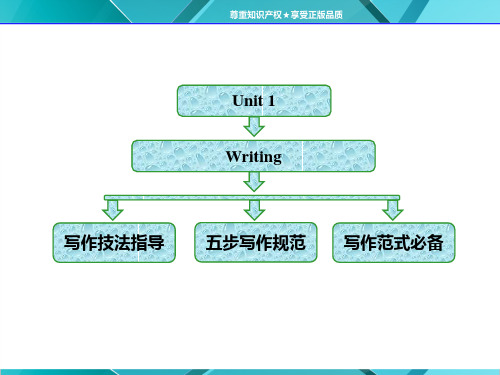
第一步:细审题、三确定 建议信 ; 1.确定体裁:本文为__________
第二人称 ; 2.确定人称:本文的主要人称应为____________ 一般将来时 和_____________ 一般现在时 。 3.确定时态:主要使用____________
第二步:拟要点、列提纲 现状:①_____________________________________________ ②_____________________________________________ ③_____________________________________________ 建议:①_____________________________________________ ②_____________________________________________ ③________________________________________主题。在书信正文的开头找准话题的 切入点,自然而然地引出自己想要谈的主题。写信时要充分了 解情况,有的放矢,以提高书信的针对性。 2.给出希望对方采取或终止某种行为的理由。在陈述理 由的过程中要换位思考,尽量为对方考虑。要用事实说话,以 增强说服力。
3.语气要委婉。让对方考虑你的想法或者建议,以理服 人是关键,不要把自己的想法强加于人。 4.给出合理建议,通过提建议让对方明确行动的方向, 从而达到写信的最终目的。
要点五:你应当积极参加各种活动。
You should take an active part in all kinds of activities. __________________________________________________
要点六:这会使你的生活更加有趣。
大学英语写作技巧整理版

Part One: Manuscript Form1.Arrangement:a.标题:大写:第一个和最后一个单词和其他的单词(包括带连字符的合成词)。
冠词、并列连词(and, or, but, nor, for),介词,不定式to除外。
标点:可用问号。
引用或文章标题要加引号。
书名加下划线。
b.段落:每段第一行缩进4到5个字母的距离。
2.Capitalizationa.当成句子用的句子成分后也要加句号。
b.专有名词的大写:President Brown, the Middle Ages, Marxist, Darwinism, Hegelian,Confucian, Latinize, Vietnamize3.Word Division原则:按音节分,不要把连字符放在开头。
a.不能分单音节词。
如:through, march, brain,pushed.b.一行的末尾或开头不能出现一个字母。
如:a lone, trick y.c.不能把两个字母的音节放在开头。
如:hat ed, cab in.d.避免划分专有人名或地名。
如:Chi na, Aus tene.带连字符的词只在连字符处划分。
f.不要误导读者。
如:pea cock, re ally.g.带词缀时在词缀处划分。
h.换页时不要划分。
i.带双辅音时在双辅音处划分。
如:strug gle, shat ter.Part Two: Diction1.Levels of Words:From a stylistic point of view:Formal words: 很多包含三或三个以上的音节Common wordsInformal words: 通常只有一或两个音节Slang: 非常不正式,文化低的人通常使用。
2.the meaning of words①denotative meaning (dictionary)&connotative meaning(feeling or idea suggested by it )a.country, nation, state and landcountry: an area of land and its population and governmentnation:the people of a countrystate: the government or political organization of a countryland: less precise but more literary and emotive than countryrge and big:large: slightly more formal, unusually big, more emphaticc.small and littlesmall: objective little: a feeling of fondnessd.modest(virtue) and humble②different collocations:Large: amount, number and quantityGreat: personal qualities like courage, confidence, ability and wisdom③不要和中文混用Send: cause to go or be taken to a place without going oneself.Family and home: family: people related to one. Home: place where one lives.3.general and specific wordprofessionals &scientists, doctors, teachersscientists &physicists, chemistschemists &biochemistshouse &mansion, villa, chateau, cottage, bungalow, cabin, hut, shack, shanty, shed, barnlaugh &smile, grin, beam, giggle, titter, snigger, chuckle, guffaw, chortle写作时尽量用specific words用specific word时要展示出具体细节:P14:students do many interesting things after class.4.idioms不正式或口语化的用于对话;俚语式的应谨慎使用:all balled up: troubled or confused; cough up: produce sth.许多陈词滥调式的也要少用。
英语一大作文中文思路
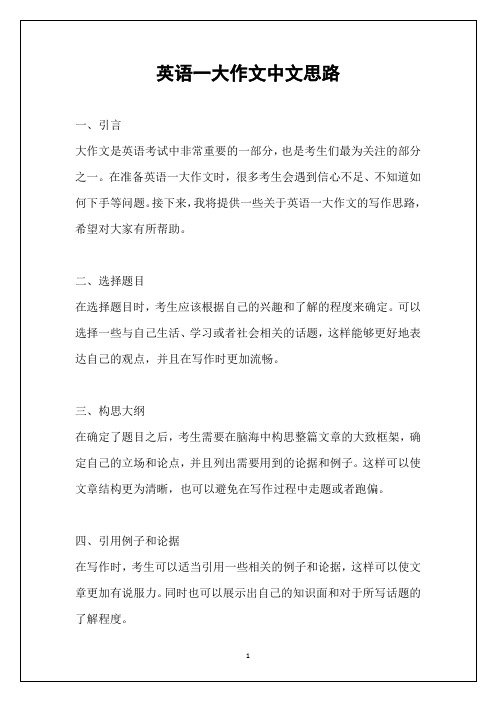
在确定了题目之后,考生需要在脑海中构思整篇文章的大致框架,确定自己的立场和论点,并且列出需要用到的论据和例子。这样可以使文章结构更为清晰,也可以避免在写作过程中走题或者跑偏。
四、引ห้องสมุดไป่ตู้例子和论据
在写作时,考生可以适当引用一些相关的例子和论据,这样可以使文章更加有说服力。同时也可以展示出自己的知识面和对于所写话题的了解程度。
七、总结
对于英语一大作文来说,好的思路和充分的准备是非常重要的。希望以上提供的写作思路能够对大家在备考时有所帮助,也希望大家都能够取得满意的成绩。
五、注意逻辑和连贯
在写作时,考生需要确保文章的逻辑性和连贯性。可以通过使用一些连接词和连接句来使文章段落之间的关系更为紧密,同时也可以让整篇文章更加通顺和易读。
六、审查和修改
在完成大作文后,考生需要花一定的时间来审查和修改自己的文章。可以检查一些语法错误、词汇搭配以及表达方式是否得当。同时也可以根据需要对文章的结构和内容进行修改和完善。
英语一大作文中文思路
一、引言
大作文是英语考试中非常重要的一部分,也是考生们最为关注的部分之一。在准备英语一大作文时,很多考生会遇到信心不足、不知道如何下手等问题。接下来,我将提供一些关于英语一大作文的写作思路,希望对大家有所帮助。
二、选择题目
在选择题目时,考生应该根据自己的兴趣和了解的程度来确定。可以选择一些与自己生活、学习或者社会相关的话题,这样能够更好地表达自己的观点,并且在写作时更加流畅。
大学英语写作技巧方法
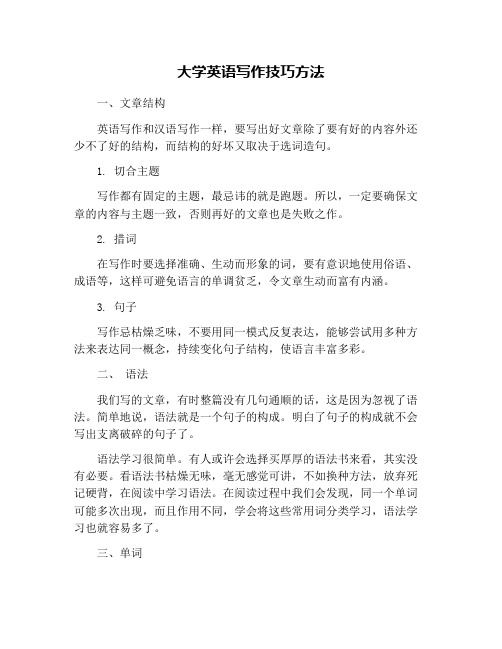
大学英语写作技巧方法
一、文章结构
英语写作和汉语写作一样,要写出好文章除了要有好的内容外还少不了好的结构,而结构的好坏又取决于选词造句。
1. 切合主题
写作都有固定的主题,最忌讳的就是跑题。
所以,一定要确保文章的内容与主题一致,否则再好的文章也是失败之作。
2. 措词
在写作时要选择准确、生动而形象的词,要有意识地使用俗语、成语等,这样可避免语言的单调贫乏,令文章生动而富有内涵。
3. 句子
写作忌枯燥乏味,不要用同一模式反复表达,能够尝试用多种方法来表达同一概念,持续变化句子结构,使语言丰富多彩。
二、语法
我们写的文章,有时整篇没有几句通顺的话,这是因为忽视了语法。
简单地说,语法就是一个句子的构成。
明白了句子的构成就不会写出支离破碎的句子了。
语法学习很简单。
有人或许会选择买厚厚的语法书来看,其实没有必要。
看语法书枯燥无味,毫无感觉可讲,不如换种方法,放弃死记硬背,在阅读中学习语法。
在阅读过程中我们会发现,同一个单词可能多次出现,而且作用不同,学会将这些常用词分类学习,语法学习也就容易多了。
三、单词
在大学英语学习过程中,单词对于绝大部分同学来说都是一大难题,不过在写作中单词的积累尤为重要。
对于记单词,我们能够在小本上抄写10个左右的单词,作为一天的任务,这样久而久之就会积累大量单词。
另一种方法就是通过阅读记单词,在读的同时配合手写,这样不但会读而且会写。
大学英语写作技巧的有效方法

大学英语写作技巧的有效方法大学英语写作的技巧对于许多学生来说如同探索一片未知的大陆。
在这片领域里,每一个学生都渴望找到属于自己的成功之路。
想要在这条道路上取得进步,掌握有效的写作方法显得尤为重要。
以下是一些在大学英语写作中极具效果的技巧,能够帮助学生提升写作能力,达到更高的学术标准。
首先,了解写作目的和受众是写作的起点。
无论是撰写学术论文、研究报告还是个人反思,明确写作目的能够帮助学生设定清晰的目标。
而了解受众的需求和期望,则能引导学生在写作时调整语调和风格,使文章更加契合读者的期待。
掌握这一步骤能够确保写作内容的精准性和针对性。
其次,组织思路和结构是提升写作质量的关键。
一个清晰的结构能够帮助读者更好地理解文章内容。
有效的结构通常包括引言、正文和结论。
在引言部分,学生需要引入话题,设定研究的背景和目的。
正文部分则应围绕主题展开,提供充分的论据和分析。
结论则应总结主要观点,并提出进一步的思考或建议。
良好的结构不仅提高文章的可读性,也使论点更加有力。
此外,丰富的词汇和多样的句型是增强写作表现力的重要工具。
通过不断扩展词汇量,学生可以用更准确的词汇表达复杂的思想和情感。
同时,多样化的句型能避免重复和单调,使文章更加生动有趣。
定期阅读优质的英语文章,如经典文学作品、学术期刊和高质量的新闻报道,可以帮助学生积累词汇和句型,提升写作能力。
写作过程中,逻辑性和连贯性是不可忽视的要素。
每一段落和句子之间都应有自然的过渡,确保文章的整体连贯性。
使用逻辑连接词,如“因此”、“然而”、“例如”等,可以帮助构建清晰的逻辑关系,使文章内容更加流畅。
有效的过渡不仅能提高文章的可读性,也能使论证更加严谨有力。
审稿和修订是提升写作质量的不可或缺的环节。
完成初稿后,学生应仔细审阅文章,检查语法、拼写和标点等细节问题。
同时,还应关注文章的逻辑性和结构性,确保每一个论点都得到充分支持。
通过反复修订,学生可以发现和纠正文章中的不足,最终提高写作水平。
大学英语作文写作技巧

大学英语作文写作技巧大学英语作文写作技巧大学英语写作其实是很有诀窍的,就看你愿不愿意记一些东西了,以下是店铺为大家精心搜集和整理的大学英语作文写作技巧,希望大家喜欢!(一)掌握技巧:(1)注意篇章结构,合理布局开始部分(opening paragraph)——说出文中的要点、核心问题。
正文部分(Body paragraphs)——围绕主题开展叙述、讨论。
结尾部分(concluding paragraphs)——对全文的总结和概括。
要做到全文中心突出、段落之间必须是有机地联系,内容完整、连贯。
前后呼应,祛除与主题无关的内容.(2)确定主题句主题句是对全文的概括,是文章的主旨。
它能在文章中起到“画龙点睛”的作用。
通常主题句出现在一篇文章的.开头,而后,全文对主题句所提出的内容进行解释,扩展。
写主题句应注意以下几点:①归纳出你要写的文章的几个要点②提炼出一句具有概括性的话③主题句应具有可读性,抓住、吸引读者。
(二)巧用连接词要想使文章有整体性、连贯性,就要学会正确使用连接词表示罗列增加First, second, third,First, then / next, after that / next, finallyFor one thing … for another…,On (the) one hand…on the other hand,Besides / what’s more / in addition / furthermore / moreover / another / also,Especially / In particular,表示时间顺序now, at present, recently,after, afterwards, after that, after a while, in a few days,at first, in the beginning, to begin with,later, next, finally,immediately, soon, suddenly, all of a sudden, at that moment, as soon as, the momentform now on, from then on,at the same time, meanwhile,till, not…until, before, after, when, while, as during,表示解释说明now, in addition, for example, for instance, in this case, moreoverfurthermore, in fact, actually表示转折关系but, however, while, though, or, otherwise, on the contrary, on the otherhand, in contrast, despite, in spite of, even though, except (for), instead, of course, after all,表示并列关系or, and, also, too, not only … but also, as well as, both… and, either …or, neither …nor表示因果关系because, b ecause of, since, now that, as, thanks to…, due to…, therefore, as a result (of), otherwise, so…that, such…that 表示条件关系as (so) long as, on condition that, if, unless表示让步关系though, although, as, even if, even though, whether …or…,however, whoever,whatever, whichever, wherever, whenever, no matter how (who, what, which, where, when, whom)表示举例for example, for instance, such as…, take… for example表示比较be similar to, similarly, the same as, in contrast, compared with (to)…just like, just as,表示目的for this reason,, for this purpose, so that, in order to, so as to, 表示强调in deed, in fact, surely, certainly, no doubt, without any doubt, truly, obviously, above all,表示概括归纳in a word, in short, in brief, on the whole, generally speaking, in my opinion, as far as I know, As we all know, as has been stated, as I have shown, finally, at last, in summary, in conclusion,(三)掌握常用句型:1. in order to为了实现他的梦想,他学习非常努力。
有效的大学英语作业写作技巧分享
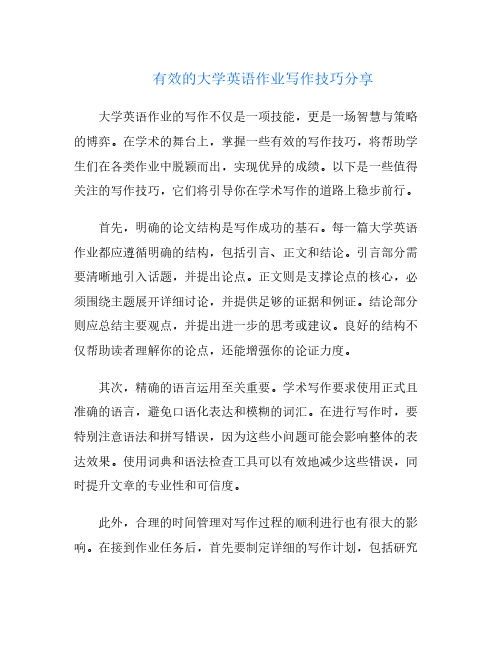
有效的大学英语作业写作技巧分享大学英语作业的写作不仅是一项技能,更是一场智慧与策略的博弈。
在学术的舞台上,掌握一些有效的写作技巧,将帮助学生们在各类作业中脱颖而出,实现优异的成绩。
以下是一些值得关注的写作技巧,它们将引导你在学术写作的道路上稳步前行。
首先,明确的论文结构是写作成功的基石。
每一篇大学英语作业都应遵循明确的结构,包括引言、正文和结论。
引言部分需要清晰地引入话题,并提出论点。
正文则是支撑论点的核心,必须围绕主题展开详细讨论,并提供足够的证据和例证。
结论部分则应总结主要观点,并提出进一步的思考或建议。
良好的结构不仅帮助读者理解你的论点,还能增强你的论证力度。
其次,精确的语言运用至关重要。
学术写作要求使用正式且准确的语言,避免口语化表达和模糊的词汇。
在进行写作时,要特别注意语法和拼写错误,因为这些小问题可能会影响整体的表达效果。
使用词典和语法检查工具可以有效地减少这些错误,同时提升文章的专业性和可信度。
此外,合理的时间管理对写作过程的顺利进行也有很大的影响。
在接到作业任务后,首先要制定详细的写作计划,包括研究、草拟、修改和定稿等阶段。
合理分配时间,避免临时抱佛脚,不仅能提高写作质量,还能减少压力,保持写作的连贯性。
研究与分析是学术写作中不可或缺的一部分。
在开始写作之前,深入研究相关的文献和资料是必需的。
通过广泛的阅读,了解现有的研究成果和观点,能够帮助你更好地理解课题,并在自己的作业中提出有力的论证。
同时,在引用他人观点时,必须遵循正确的引文格式,避免抄袭,并尊重他人的知识产权。
在写作过程中,逻辑性和条理性同样重要。
每一个段落都应有明确的主题句,并且所有的句子和段落之间应当逻辑连贯。
为了增强文章的逻辑性,可以使用过渡词和连接词,这不仅有助于读者理解文章结构,也使得文章的论述更加自然流畅。
有效的自我评估和修改也是成功写作的关键。
在完成初稿后,应该对自己的文章进行反复审阅,检查逻辑是否清晰,论点是否充分。
全新版大学进阶英语阅读写作教程1 unit1
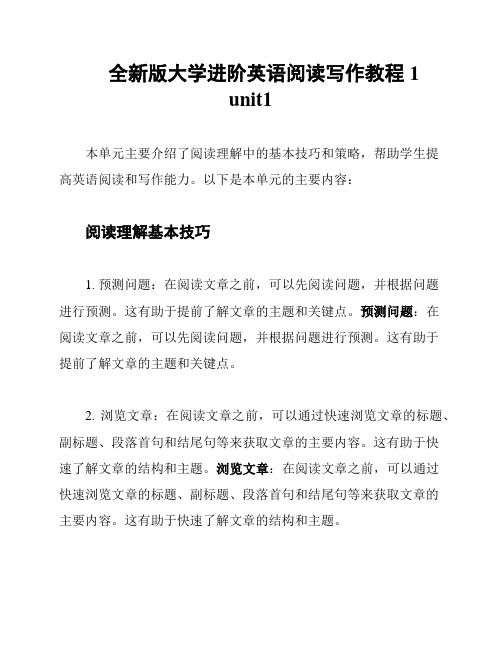
全新版大学进阶英语阅读写作教程1unit1本单元主要介绍了阅读理解中的基本技巧和策略,帮助学生提高英语阅读和写作能力。
以下是本单元的主要内容:阅读理解基本技巧1. 预测问题:在阅读文章之前,可以先阅读问题,并根据问题进行预测。
这有助于提前了解文章的主题和关键点。
预测问题:在阅读文章之前,可以先阅读问题,并根据问题进行预测。
这有助于提前了解文章的主题和关键点。
2. 浏览文章:在阅读文章之前,可以通过快速浏览文章的标题、副标题、段落首句和结尾句等来获取文章的主要内容。
这有助于快速了解文章的结构和主题。
浏览文章:在阅读文章之前,可以通过快速浏览文章的标题、副标题、段落首句和结尾句等来获取文章的主要内容。
这有助于快速了解文章的结构和主题。
3. 扫读关键词:在阅读文章时,可以扫读关键词和关键短语,以便更好地理解文章的关键信息和主要观点。
扫读关键词:在阅读文章时,可以扫读关键词和关键短语,以便更好地理解文章的关键信息和主要观点。
4. 推理与判断:在阅读文章时,可以根据已知信息进行推理和判断,以推导出作者的观点和意图。
推理与判断:在阅读文章时,可以根据已知信息进行推理和判断,以推导出作者的观点和意图。
阅读理解策略1. 重点标记:在阅读文章时,可以使用标记笔或标记功能对关键信息进行标记,以便于后续复和理解。
重点标记:在阅读文章时,可以使用标记笔或标记功能对关键信息进行标记,以便于后续复习和理解。
2. 筛选信息:在阅读文章时,可以根据问题要求,筛选出与问题相关的信息,有针对性地进行阅读。
筛选信息:在阅读文章时,可以根据问题要求,筛选出与问题相关的信息,有针对性地进行阅读。
3. 归纳总结:在阅读文章之后,可以进行归纳总结,将文章的主要观点和主题进行概括和整理。
归纳总结:在阅读文章之后,可以进行归纳总结,将文章的主要观点和主题进行概括和整理。
4. 拓展思考:在阅读文章之后,可以进行拓展思考,思考文章内容在其他领域的应用和相关话题。
大作文英语一怎么学
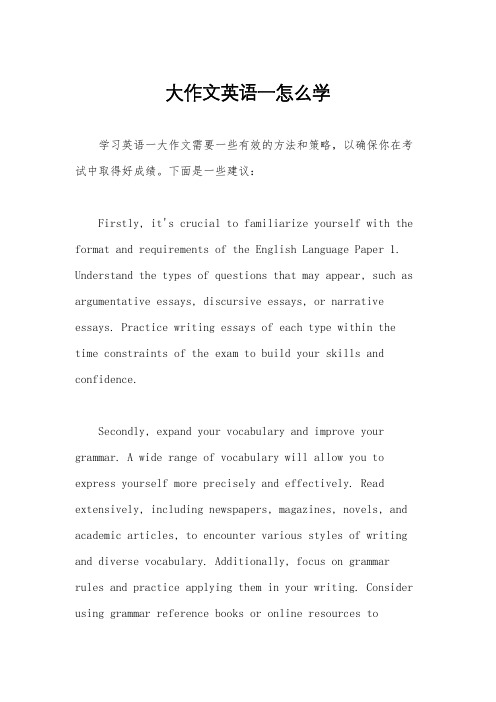
大作文英语一怎么学学习英语一大作文需要一些有效的方法和策略,以确保你在考试中取得好成绩。
下面是一些建议:Firstly, it's crucial to familiarize yourself with the format and requirements of the English Language Paper 1. Understand the types of questions that may appear, such as argumentative essays, discursive essays, or narrative essays. Practice writing essays of each type within the time constraints of the exam to build your skills and confidence.Secondly, expand your vocabulary and improve your grammar. A wide range of vocabulary will allow you to express yourself more precisely and effectively. Read extensively, including newspapers, magazines, novels, and academic articles, to encounter various styles of writing and diverse vocabulary. Additionally, focus on grammar rules and practice applying them in your writing. Consider using grammar reference books or online resources toreinforce your understanding.Thirdly, work on your writing skills by practicing regularly. Set aside time to write essays on different topics and under timed conditions. Pay attention to your organization, coherence, and clarity of expression. Practice structuring your essays with clear introduction, body paragraphs, and conclusion. Furthermore, seek feedback from teachers, tutors, or peers to identify areas for improvement and refine your writing style.Fourthly, analyze sample essays and learn from exemplary pieces of writing. Examine how authors construct arguments, use evidence to support their points, and employ persuasive language techniques. Identify the strengths and weaknesses of each essay and consider how you can apply similar strategies in your own writing.Lastly, develop your critical thinking skills. Engage with a variety of topics and viewpoints, and practice forming well-reasoned arguments supported by evidence. Consider the implications of different perspectives andevaluate the validity of arguments presented in essays and other texts. Developing critical thinking skills will not only enhance your writing ability but also improve your overall comprehension and analysis skills.In conclusion, mastering the English Language Paper 1 requires a combination of preparation, practice, andcritical thinking. By familiarizing yourself with the exam format, expanding your vocabulary, honing your writing skills, studying exemplary essays, and developing your critical thinking ability, you can improve your performance and achieve success in the exam.。
大作文英语一写作思路
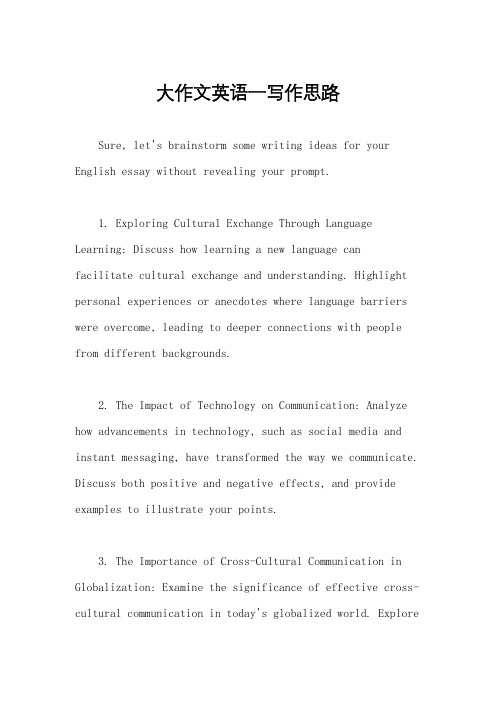
大作文英语一写作思路Sure, let's brainstorm some writing ideas for your English essay without revealing your prompt.1. Exploring Cultural Exchange Through Language Learning: Discuss how learning a new language canfacilitate cultural exchange and understanding. Highlight personal experiences or anecdotes where language barriers were overcome, leading to deeper connections with people from different backgrounds.2. The Impact of Technology on Communication: Analyze how advancements in technology, such as social media and instant messaging, have transformed the way we communicate. Discuss both positive and negative effects, and provide examples to illustrate your points.3. The Importance of Cross-Cultural Communication in Globalization: Examine the significance of effective cross-cultural communication in today's globalized world. Explorehow misunderstandings can arise from cultural differences and discuss strategies to promote better intercultural understanding.4. Language Preservation and Revitalization Efforts: Investigate efforts to preserve and revitalize endangered languages around the world. Discuss the importance of linguistic diversity and the cultural significance of preserving languages facing extinction.5. The Role of Language in Identity Formation: Explore how language shapes individual and group identities. Discuss how language use reflects cultural values and societal norms, and examine the impact of language policies on identity politics.6. Language and Power Dynamics: Analyze how language can be used as a tool of power and control in various contexts, such as politics, media, and education. Discuss instances where language has been manipulated to influence public opinion or perpetuate inequalities.7. The Influence of English as a Global Lingua Franca: Examine the dominance of English as a global language and its implications for linguistic diversity. Discuss both the benefits and challenges of English as a lingua franca in international communication.8. The Evolution of Slang and Language Change: Explore the dynamic nature of language through the evolution of slang and informal language usage. Discuss how language adapts to social and cultural changes, reflecting shifts in attitudes and values over time.9. Language and Gender: Investigate the ways in which language intersects with gender identity and stereotypes. Discuss linguistic features associated with gender, such as speech patterns and vocabulary choice, and analyze how they contribute to gender norms and expectations.10. Bilingualism and Cognitive Benefits: Examine the cognitive benefits of bilingualism and multilingualism, such as enhanced problem-solving skills and cognitive flexibility. Discuss research findings on the cognitiveadvantages of speaking multiple languages and implications for education policy.Choose a topic that interests you the most, and then we can develop a detailed outline for your essay.。
英语一作文写作思路
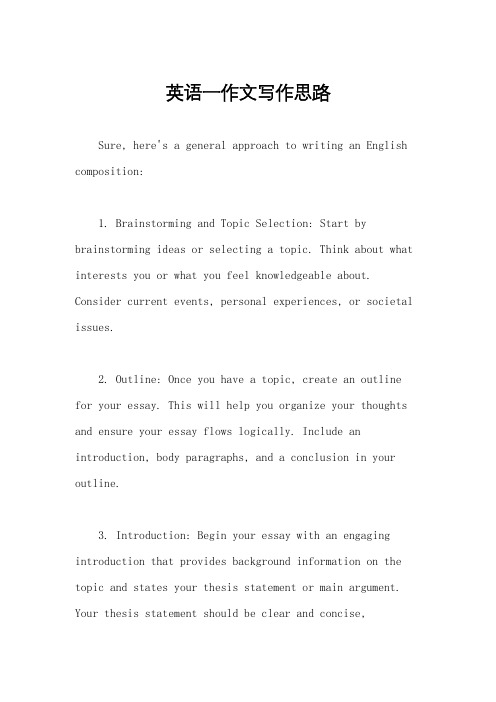
英语一作文写作思路Sure, here's a general approach to writing an English composition:1. Brainstorming and Topic Selection: Start by brainstorming ideas or selecting a topic. Think about what interests you or what you feel knowledgeable about. Consider current events, personal experiences, or societal issues.2. Outline: Once you have a topic, create an outline for your essay. This will help you organize your thoughts and ensure your essay flows logically. Include an introduction, body paragraphs, and a conclusion in your outline.3. Introduction: Begin your essay with an engaging introduction that provides background information on the topic and states your thesis statement or main argument. Your thesis statement should be clear and concise,outlining the main point or argument of your essay.4. Body Paragraphs: The body of your essay should consist of several paragraphs that support your thesis statement. Each paragraph should focus on a single point or idea and include supporting evidence or examples. Use transition words and phrases to connect your ideas and ensure a smooth flow between paragraphs.5. Supporting Evidence: Use a variety of sources to support your arguments, including facts, statistics, expert opinions, and real-life examples. Make sure to cite your sources properly if you are using quotes or information from other sources.6. Counterarguments and Rebuttals: Anticipate potential counterarguments to your thesis statement and address them in your essay. This shows that you have considereddifferent perspectives and strengthens your argument. Be sure to provide evidence and reasoning to refute counterarguments effectively.7. Conclusion: End your essay with a strong conclusion that summarizes the main points of your essay and restates your thesis statement. Avoid introducing new information in the conclusion and instead focus on reinforcing your main argument and leaving a lasting impression on the reader.8. Proofreading and Editing: Once you have finished writing your essay, take the time to proofread and edit it carefully. Check for grammatical errors, punctuation mistakes, and clarity of expression. Consider asking someone else to read your essay and provide feedback.9. Final Touches: Make any necessary revisions based on feedback and ensure that your essay meets all the requirements, including word count and formatting guidelines.By following these steps, you can effectively plan, write, and revise your English composition to create awell-structured and persuasive essay. Remember to stay focused on your main argument and provide strong supporting evidence to convince your reader of your viewpoint.。
英语一作文怎么写好看
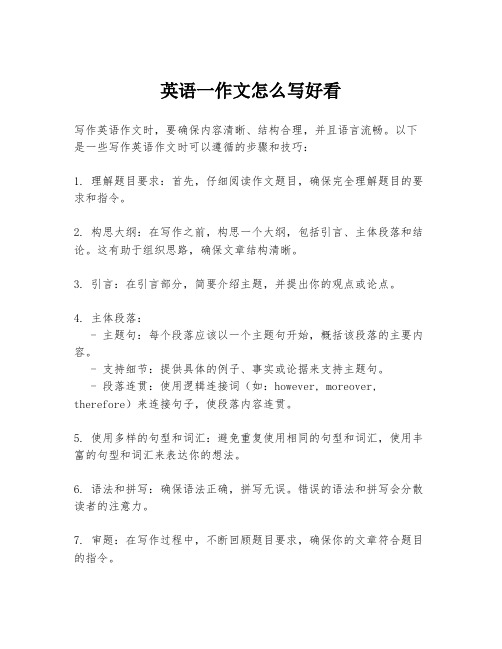
英语一作文怎么写好看
写作英语作文时,要确保内容清晰、结构合理,并且语言流畅。
以下是一些写作英语作文时可以遵循的步骤和技巧:
1. 理解题目要求:首先,仔细阅读作文题目,确保完全理解题目的要求和指令。
2. 构思大纲:在写作之前,构思一个大纲,包括引言、主体段落和结论。
这有助于组织思路,确保文章结构清晰。
3. 引言:在引言部分,简要介绍主题,并提出你的观点或论点。
4. 主体段落:
- 主题句:每个段落应该以一个主题句开始,概括该段落的主要内容。
- 支持细节:提供具体的例子、事实或论据来支持主题句。
- 段落连贯:使用逻辑连接词(如:however, moreover, therefore)来连接句子,使段落内容连贯。
5. 使用多样的句型和词汇:避免重复使用相同的句型和词汇,使用丰富的句型和词汇来表达你的想法。
6. 语法和拼写:确保语法正确,拼写无误。
错误的语法和拼写会分散读者的注意力。
7. 审题:在写作过程中,不断回顾题目要求,确保你的文章符合题目的指令。
8. 结论:在结论部分,总结你的观点,并提供一个有力的结尾,使读者留下深刻印象。
9. 审稿和修改:完成初稿后,仔细审阅文章,检查语法错误,改善句子结构,确保文章流畅。
10. 练习和反馈:多练习写作,并寻求老师或同学的反馈,不断改进写作技巧。
记住,写作是一个不断学习和提高的过程,通过不断的练习和反思,你的英语写作能力会逐渐提高。
英语第一单元作文方法
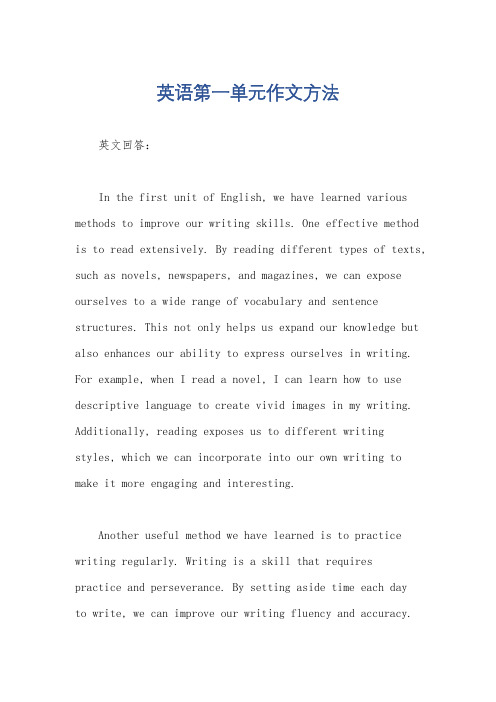
英语第一单元作文方法英文回答:In the first unit of English, we have learned various methods to improve our writing skills. One effective method is to read extensively. By reading different types of texts, such as novels, newspapers, and magazines, we can expose ourselves to a wide range of vocabulary and sentence structures. This not only helps us expand our knowledge but also enhances our ability to express ourselves in writing. For example, when I read a novel, I can learn how to use descriptive language to create vivid images in my writing. Additionally, reading exposes us to different writing styles, which we can incorporate into our own writing to make it more engaging and interesting.Another useful method we have learned is to practice writing regularly. Writing is a skill that requirespractice and perseverance. By setting aside time each dayto write, we can improve our writing fluency and accuracy.For instance, I like to keep a journal where I write about my daily experiences and reflections. This not only helps me organize my thoughts but also allows me to experimentwith different writing techniques. Moreover, I find it helpful to seek feedback from others, such as my classmates or teachers, as their perspectives can provide valuable insights and suggestions for improvement.Furthermore, studying grammar and vocabulary isessential for enhancing our writing skills. Byunderstanding the rules of grammar and expanding our vocabulary, we can express our ideas more clearly and effectively. For example, learning different verb tenses enables us to convey actions that have happened in the past, present, or future. Additionally, having a wide range of vocabulary allows us to choose the most appropriate wordsto convey our intended meaning. To improve my grammar and vocabulary, I often use online resources, such as grammar websites and vocabulary apps, which provide interactive exercises and quizzes.中文回答:在英语的第一单元中,我们学习了各种提高写作技巧的方法。
英语第一单元作文方法
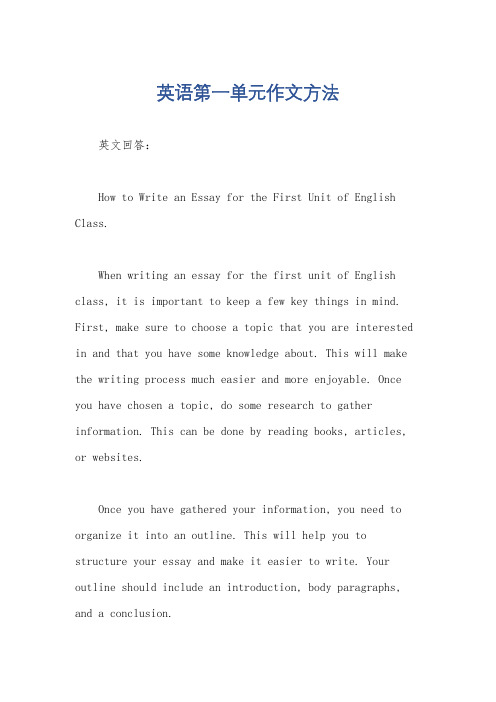
英语第一单元作文方法英文回答:How to Write an Essay for the First Unit of English Class.When writing an essay for the first unit of English class, it is important to keep a few key things in mind. First, make sure to choose a topic that you are interested in and that you have some knowledge about. This will make the writing process much easier and more enjoyable. Once you have chosen a topic, do some research to gather information. This can be done by reading books, articles, or websites.Once you have gathered your information, you need to organize it into an outline. This will help you to structure your essay and make it easier to write. Your outline should include an introduction, body paragraphs, and a conclusion.The introduction should introduce your topic andprovide some background information. The body paragraphs should each focus on a different aspect of your topic. The conclusion should summarize your main points and provide a final thought.When writing your essay, be sure to use clear and concise language. Avoid using slang or jargon. Also, besure to proofread your essay carefully before submitting it.中文回答:英语第一单元作文方法。
英语一大作文怎么学
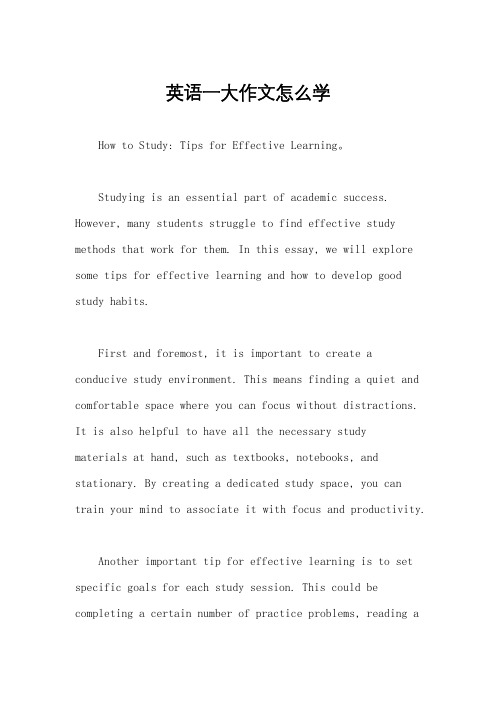
英语一大作文怎么学How to Study: Tips for Effective Learning。
Studying is an essential part of academic success. However, many students struggle to find effective study methods that work for them. In this essay, we will explore some tips for effective learning and how to develop good study habits.First and foremost, it is important to create a conducive study environment. This means finding a quiet and comfortable space where you can focus without distractions. It is also helpful to have all the necessary studymaterials at hand, such as textbooks, notebooks, and stationary. By creating a dedicated study space, you can train your mind to associate it with focus and productivity.Another important tip for effective learning is to set specific goals for each study session. This could be completing a certain number of practice problems, reading aspecific chapter, or mastering a particular concept. Setting goals not only helps you stay focused, but also gives you a sense of accomplishment when you achieve them.In addition to setting goals, it is also important to manage your time effectively. This means creating a study schedule and sticking to it. By allocating specific times for studying each day, you can avoid procrastination and ensure that you cover all the necessary material before exams. Time management also involves taking regular breaks to avoid burnout and maintain focus.Furthermore, it is crucial to actively engage with the material while studying. This could involve taking notes, asking questions, or discussing the material with classmates. By actively participating in the learning process, you can reinforce your understanding of the material and retain information more effectively.Another effective study method is to use mnemonic devices and other memory techniques. Mnemonics involve creating associations or acronyms to help rememberinformation. For example, creating a rhyme or a visual image to remember a list of items. By using memory techniques, you can improve your recall and retention of information.Finally, it is important to review and revise the material regularly. This could involve going over your notes, practicing past exam questions, or teaching the material to someone else. By revisiting the material, you can reinforce your understanding and identify any areasthat require further clarification.In conclusion, effective studying is a skill that can be developed with practice and dedication. By creating a conducive study environment, setting specific goals, managing your time, actively engaging with the material, using memory techniques, and revising regularly, you can improve your learning and academic performance. It is important to find study methods that work for you and adapt them to your individual learning style. With the right approach, anyone can become a successful and efficient learner.。
Unit 1大学英语写作技巧

Practice 3
• Think about the list of topics that follow. Put a L before each topic that you would probably develop according to logical order if you were writing about it.
• Description may follow various kinds of order, depending on what is being described.
• One kind of description follows space order. In space order we tell where things are.
• ___The importance of good health habits • ___ My vacation trip • ___ Spring is my favorite season • ___ The characteristics of Indian music • ___ Why I want to be a lawyer • ___ How I spent last Sunday • ___ The growth of opportunities for women in business and
morechancesofvariousdiseasesconclusion????????????????assignment?writethesisstatementforanytwoofthefollowingsubjects
大学英语写作技巧(1)
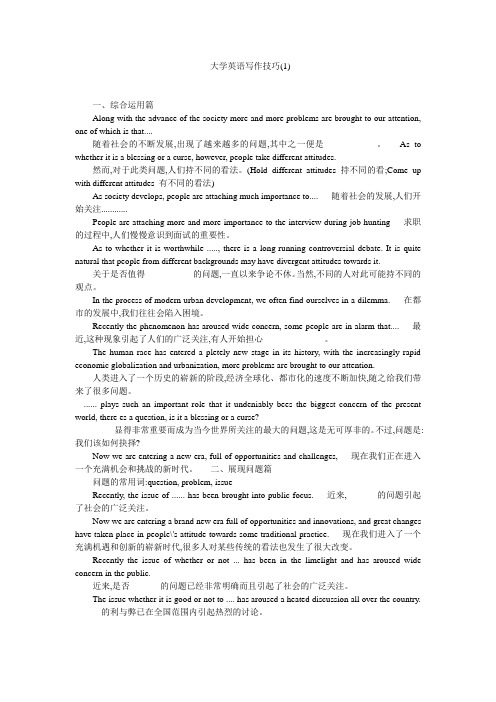
大学英语写作技巧(1)一、综合运用篇Along with the advance of the society more and more problems are brought to our attention, one of which is that....随着社会的不断发展,出现了越来越多的问题,其中之一便是____________。
As to whether it is a blessing or a curse, however, people take different attitudes.然而,对于此类问题,人们持不同的看法。
(Hold different attitudes 持不同的看;Come up with different attitudes 有不同的看法)As society develops, people are attaching much importance to.... 随着社会的发展,人们开始关注............People are attaching more and more importance to the interview during job hunting 求职的过程中,人们慢慢意识到面试的重要性。
As to whether it is worthwhile ....., there is a long-running controversial debate. It is quite natural that people from different backgrounds may have divergent attitudes towards it.关于是否值得___________的问题,一直以来争论不休。
当然,不同的人对此可能持不同的观点。
In the process of modern urban development, we often find ourselves in a dilemma. 在都市的发展中,我们往往会陷入困境。
英语一大作文方法
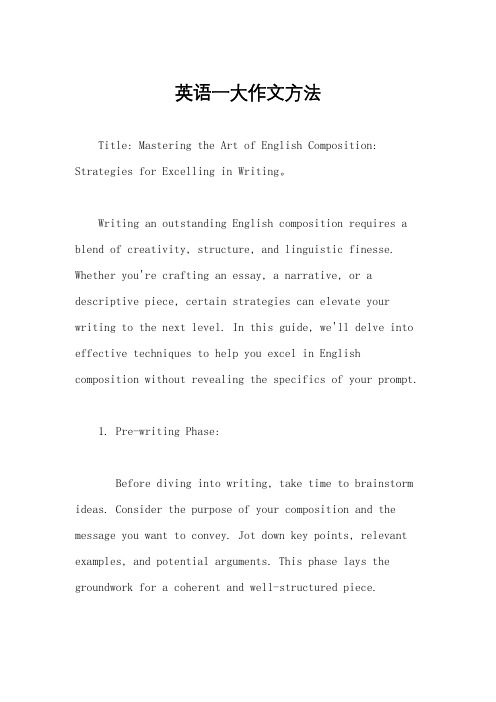
英语一大作文方法Title: Mastering the Art of English Composition: Strategies for Excelling in Writing。
Writing an outstanding English composition requires a blend of creativity, structure, and linguistic finesse. Whether you're crafting an essay, a narrative, or a descriptive piece, certain strategies can elevate your writing to the next level. In this guide, we'll delve into effective techniques to help you excel in English composition without revealing the specifics of your prompt.1. Pre-writing Phase:Before diving into writing, take time to brainstorm ideas. Consider the purpose of your composition and the message you want to convey. Jot down key points, relevant examples, and potential arguments. This phase lays the groundwork for a coherent and well-structured piece.2. Understanding the Prompt Implicitly:While you're prohibited from explicitly mentioning your prompt, ensure a thorough understanding of its requirements. Identify the central theme, key concepts, and any specific instructions provided. This implicit comprehension will guide your writing process without compromising the confidentiality of your prompt.3. Introduction:Begin your composition with a captivatingintroduction that hooks the reader's attention. Utilize techniques such as a thought-provoking question, an anecdote, or a compelling statistic to engage your audience. Clearly state the purpose of your writing without directly referencing the prompt.4. Thesis Statement:Craft a clear and concise thesis statement that encapsulates the main argument or idea of your composition.This statement serves as the guiding beacon throughout your writing, directing the flow of your arguments and providing coherence to your piece.5. Body Paragraphs:Organize your body paragraphs logically, each focusing on a distinct aspect or argument related to your thesis. Employ topic sentences to introduce the main idea of each paragraph, followed by supporting evidence, examples, and analysis. Maintain coherence and cohesion by smoothly transitioning between paragraphs.6. Use of Language:Demonstrate proficiency in the English language by employing a varied and sophisticated vocabulary. Utilize synonyms, idiomatic expressions, and figurative language to enrich your writing. However, ensure clarity and precision in your choice of words to effectively convey your message.7. Sentence Structure and Grammar:Pay meticulous attention to sentence structure and grammar to ensure clarity and fluency in your writing. Vary sentence lengths and structures to maintain reader interest. Proofread your composition thoroughly to eliminate grammatical errors and typos that may detract from the quality of your work.8. Incorporating Evidence and Examples:Support your arguments with relevant evidence and examples drawn from various sources such as literature, history, or personal experience. Cite your sources appropriately, adhering to the required citation style.This demonstrates critical thinking and strengthens the validity of your arguments.9. Critical Analysis:Engage in critical analysis by examining different perspectives and evaluating the strengths and weaknesses of various arguments. Avoid presenting a one-sided view;instead, demonstrate a nuanced understanding of the topicby considering opposing viewpoints and counterarguments.10. Conclusion:Conclude your composition by summarizing the main points and restating the significance of your argument.Offer insights or suggestions for further exploration ofthe topic. End with a memorable closing statement that leaves a lasting impression on the reader.11. Revision and Editing:Allocate sufficient time for revising and editing your composition. Review your work from a fresh perspective, focusing on coherence, clarity, and overall effectiveness. Make necessary revisions to refine your ideas and improve the flow of your writing.In mastering the art of English composition, practiceis paramount. Continuously challenge yourself to explore new topics, experiment with different writing styles, andrefine your skills. By implementing these strategies, you can elevate your writing to new heights of excellence while safeguarding the confidentiality of your prompt.。
英语一大作文技巧
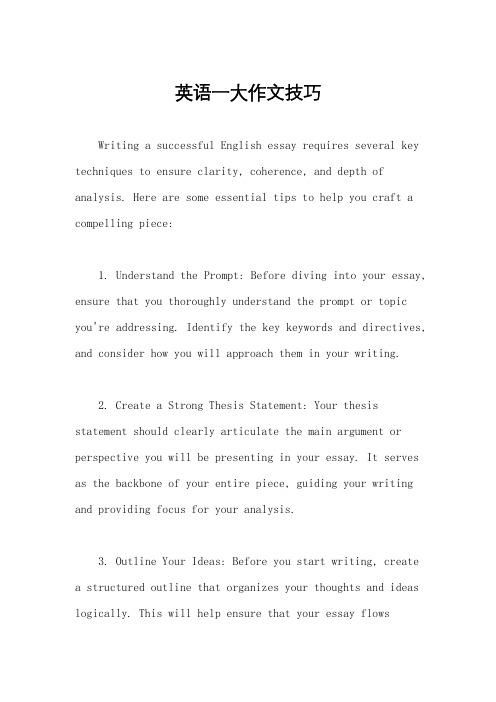
英语一大作文技巧Writing a successful English essay requires several key techniques to ensure clarity, coherence, and depth of analysis. Here are some essential tips to help you craft a compelling piece:1. Understand the Prompt: Before diving into your essay, ensure that you thoroughly understand the prompt or topic you're addressing. Identify the key keywords and directives, and consider how you will approach them in your writing.2. Create a Strong Thesis Statement: Your thesis statement should clearly articulate the main argument or perspective you will be presenting in your essay. It serves as the backbone of your entire piece, guiding your writing and providing focus for your analysis.3. Outline Your Ideas: Before you start writing, createa structured outline that organizes your thoughts and ideas logically. This will help ensure that your essay flowssmoothly and stays on track with your main argument.4. Use Clear and Concise Language: Aim for clarity and precision in your writing. Avoid overly complex sentencesor convoluted language that may confuse your reader. Use clear, straightforward language to express your ideas effectively.5. Provide Evidence and Examples: Back up your arguments with evidence and examples to support your claims. This could include quotations from literary texts,statistical data, historical facts, or real-life examples. Make sure your evidence is relevant and directly supports your thesis.6. Engage with Counterarguments: Anticipate potential counterarguments to your thesis and address them in your essay. This demonstrates critical thinking and strengthens your overall argument by acknowledging and responding to opposing viewpoints.7. Craft a Compelling Introduction: Your introductionshould grab the reader's attention and provide context for your essay. Introduce your topic, provide background information, and clearly state your thesis statement to set the stage for the rest of your writing.8. Develop Coherent Paragraphs: Each paragraph should focus on a single main idea or topic and flow logically from one to the next. Use topic sentences to introduce the main point of each paragraph and provide smooth transitions between ideas.9. Conclude Effectively: Summarize your main points and restate your thesis in the conclusion. Avoid introducing new information or arguments in the conclusion; instead, focus on reinforcing the significance of your argument and leaving a lasting impression on the reader.10. Revise and Proofread: Take the time to revise and edit your essay carefully before submitting it. Pay attention to grammar, punctuation, and spelling errors, as well as overall clarity and coherence. Consider seeking feedback from peers or instructors to identify areas forimprovement.By following these key techniques, you can enhance the quality and effectiveness of your English essays,ultimately leading to stronger arguments and more impactful writing.。
- 1、下载文档前请自行甄别文档内容的完整性,平台不提供额外的编辑、内容补充、找答案等附加服务。
- 2、"仅部分预览"的文档,不可在线预览部分如存在完整性等问题,可反馈申请退款(可完整预览的文档不适用该条件!)。
- 3、如文档侵犯您的权益,请联系客服反馈,我们会尽快为您处理(人工客服工作时间:9:00-18:30)。
Notice the italicized words that tell about time order
• Kite flying began long ago. For thousands of years, people have sent kites soaring into the sky. Recently, kite flying has become popular. Today hobby shops sell many kinds of kites. Are you ready now to try this sport? At first you may feel clumsy. Before long you will gain skill. Soon you will learn to control a kite. Someday you may even enter kite flying contests.
Practice 2
• Think about the list of topics that follow. Put a S before each topic that you would probably develop according to space order if you were writing about it.
• Example 1
Example 1---description based on space order
• The classroom is large, clean and well lighted. The walls are pale green. In the wall at the left as you enter there are three large windows. The teacher’s desk is in the front. Blackboards cover most of the wall at the right.
• Exposition tries to make ideas clear and understandable to the reader, so it follows logical order.
Practice 3
• Think about the list of topics that follow. Put a L before each topic that you would probably develop according to logical order if you were writing about it.
• ___ I enjoy weekends • ___ She is intelligent • ___ Our campus • ___ Linda is an artist • ___ A scenic view • ___ Our library • ___ Nanjing Road on Sunday • ___ My native town
• The man who opened the door in answer to my knock was an elderly man, white-haired and bent. He looked at me over his spectacles, which were far down on his nose. In spite of his age, his dark eyes were keen and his voice was clear and strong. I noticed that he was wearing a brightcolored sports shirt.
according to time order---One thing happens and then another thing happens, and the events are told in the same order. • To gain a good order, sometimes we need the help of time-order words.
Unit 1
General Introduction to Writing
Purpose of the course:
To enhance your writing ability, this course is designed to teach you:
● critical thinking skills; (逻辑思维技巧) ● steps of writing; ● ways of essay development; (文章扩展方法) ● methods of writing effective sentences ● practical writing;
• ___ weekends mean different things to different people • ___ I enjoyed a wonderful holiday • ___ A person you are familiar with • ___ Why is the weather changeable • ___ My first day to school • ___ I always feel lonely • ___ A tale of little girl • ___ A visit to a foreign country is always filled with surprise
Exposition
• It is the writing that explains something. It often answers the questions what, how and why. Its purpose is to present ideas and to make the ideas as clear as possible.
Practice 1
• Think about the list of topics that follow. Put a T before each topic that you would probably develop according to time order if you were writing about it.
● What do you hope to learn about English writing in this course?
What is writing
• Writing is a way to reach out to your world. • Writing is also a way to find out about yourself. • It is a way to explore your ideas, feelings and
Demands of the course
You will be required to: ● write long essays or short paragraphs. ● do discussions or presentations in class. ● read samples or do reading assignments.
the profession • ___ My favorite actor
Description
• Tells how something looks or feels or sounds. It talks about such features as size, shape, color, sound, or taste.
dreams. • Writing is creating, and you are its creator. • Writing is thinking, and it is discovering what
you think. • Writing is a way of finding out about your world. • Writing is a way to change it!
Discuss the following questions
● What kind of writing courses have you had up to now?
● Are the rules for writing in your native language the same as or different from those for English writing?
Types of Writing
Narration
Description
Exposition
Narration
• Tells “what happened” • It tells a story. It is the kind of writing that we find
in novels, short stories, and biographies. • In narration the sentences are usually organized
